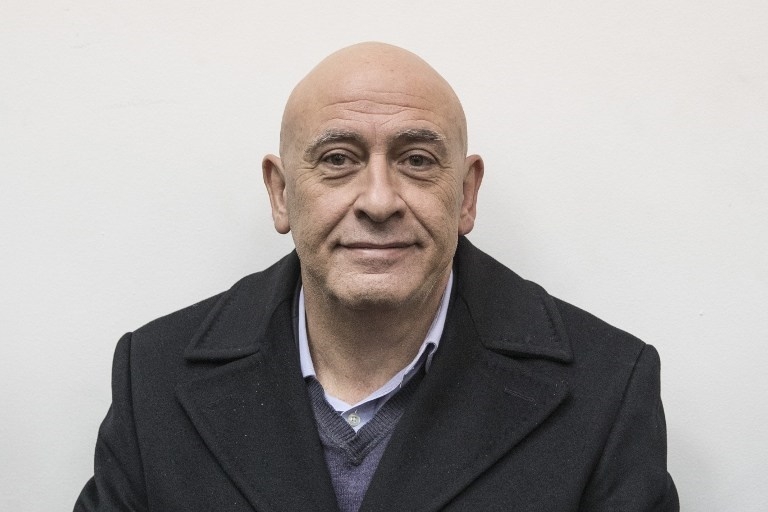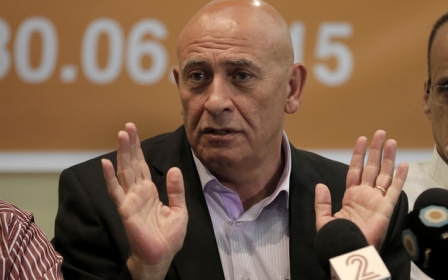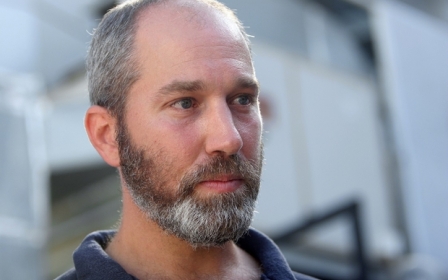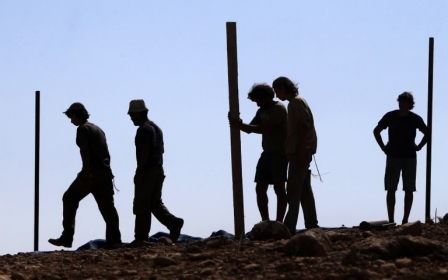The real reason why Basel Ghattas was detained

The detentions and harassment of Palestinians and their leaders in 1948 Palestine, including the Knesset member Basel Ghattas, are part of a strategy which Israel has pursed against its Arab citizens since the Nakba. This strategy is aimed at domesticating and defeating Palestinians and at punishing whomever is tempted to challenge the Jewish state.
Many Israelis believe that David Ben-Gurion made an historic mistake by failing to implement "Plan D," which would have meant the expulsion of all Palestinians from their homes. Instead, 85 percent of them were banished, leaving about 150,000 Palestinians in the country.
Israel treated these Palestinians as enemies or as time bombs, although they obtained Israeli nationality. In 2009, the Israeli historian Benny Morris blamed Ben-Gurion for not accomplishing his mission by cleansing the country of Palestinians. Morris said this posed a great danger to the future of Israel. Some Israeli leaders continue, to this day, to demand that Ben-Gurion’s "error" be rectified.
The Palestinians who remained in the country lived in a state of extreme fear. One-third of them were forced out of the towns in which they used to live and had to settle down in neighbouring towns. They became known as the "elephant in the room" and ended up being "like orphans sitting around the table of a miser," without leaders to direct them.
They felt powerless and helpless, threatened with banishment, displacement, theft and usurpation, horrified by the stories of rape and massacres in neighbouring towns, stories the Zionist gangs were keen to publicise in order to intimidate and drive them out.
Families were divided. Some members were forced to go abroad, while others remained inside the country. Mothers were separated from their sons and daughters, and tens of thousands of men were jammed inside detention camps; their sole concern was to earn a living.
After the fighting ended, Israel pounced on the Palestinians who remained in the country like a wolf on its prey, compounding the state of fear in which they lived and the psychological crisis precipitated by the Nakba. It dealt with them as if they were enemies on whom revenge should be exacted. Thus was military rule established, which lasted until 1966.
This restricted their movement and stripped them of their freedom. It banned them from communicating with each other. It turned their towns into ghettos. Leaving or entering those towns was not possible without an army permit. An extensive campaign was then launched to confiscate what remained of their lands, which had been their main source of subsistence.
Israel’s objective was to develop a new Arab personality, the personality of the defeated Arab who was powerless and helpless, one that did not believe in the ability of an Arab to change and who was willing to consider the Jews to be the masters of the land.
Bit by bit, the wounds of 1948 Palestinians started to heal, and they began to demand their rights. Israel was willing to listen as long as those demands addressed individual rights, such as the right to move and to work freely. But when it came to collective national rights, its response was violent.
Israel used detention and declarations of illegality as weapons. This happened to the Land Movement, which was founded in 1959 and demanded national rights for the Palestinians. On the eve of the 1967 war, Israel declared the movement illegal and exiled and banished some of its leaders.
The occupation of the rest of Palestine in 1967 had a positive impact on the 1948 Palestinians. It was the first time since the Nakba that they had communicated with another part of their people. They realised they were not alone in their battle, and their Palestinian identity started to re-emerge. Their voices grew louder, demanding the repatriation of those who were forced out of their villages and the cancellation of land-confiscation orders.
This movement reached its zenith with the general strike of 30 March, 1976, which is the day that became known as Land Day. The aim of the strike was to demand the abrogation of the Israeli Authorities’ orders to confiscate Arab lands. Israel tried in a variety of ways to frustrate the general strike and treat it as a rebellion and civil disobedience. When all attempts failed, it sent the army into Arab towns killing, in cold blood, six 1948 Palestinians and wounding hundreds others.
In the 1990s, the 1948 Palestinians developed a new discourse, one that challenged Israeli claims of democracy and humanity, about which they boasted to the world. The Palestinians confined their discourse to what the Israeli law permits, but at the same time they exposed the fallacy in the argument that Israel is "a state for all its citizens".
The progressive and liberal discourse adopted by the Palestinians disturbed Israel and embarrassed it, for it is a state that truly believes it exists exclusively for Jews. The Palestinian discourse shed light on the feebleness of Israel's democracy and the hollowness of its claim to be a liberal democracy.
Although the 1948 Palestinians waged their struggle within legals bounds set by Israel, they continued to be harassed and detained. In a letter sent in 2007, Yuval Diskin, the head of Israeli Intelligence, admitted that the security agencies pursued Palestinian activists even when their activity was legal and within the bounds of what Israeli democracy permitted.
He said that this happened whenever those activities undermined the Jewishness of the state of Israel. He also admitted that the intelligence agency and the police in many instances arrested and detained Palestinians – who were citizens of the state of Israel – as a warning and a deterrence despite their having done nothing illegal.
In recent years, Israel has arrested and detained a large number of Palestine 1948 leaders in an attempt to "burn the conscience" and domesticate the Palestinian discourse and exact revenge on the Palestinian leaders who succeeded in disturbing or embarrassing Israel and in frustrating its plans. The list of detainees is topped by Sheikh Raed Salah, who was active in the preservation of Islamic and Christian holy places, and in particular al-Aqsa Mosque, something that annoyed the Israeli government.
The detainees also include Knesset member Said Nafa, who was arrested because of his activities among the Druze in the country with the aim of establishing links between them and the Druze in neighbouring Arab countries. The Israeli government was alarmed by his activity and feared he would incite Druze against the state of Israel.
This is the history behind the detention of Knesset member Basel Ghattas. It is an attempt to punish him for his wide-ranging national activities during recent years, especially those carried out at the international level.
His activities included participating in the Third Freedom Flotilla, which sought to break the siege imposed on Gaza, and his participation in the anti-Israeli Apartheid Week that was organised in Canada, in addition to his communications with international institutions.
Israel believes that engaging in such activities at the international level amounts to crossing a red line. They are legal activities. As usual, Israel looks for a legal clout for detaining, punishing and banishing such activists as Basel Ghattas.
Jihad Abu Raya is a Palestinian lawyer and activist based in northern Israel. He is a founder of the Falastenyat Movement.
The views expressed in this article belong to the author and do not necessarily reflect the editorial policy of Middle East Eye.
Photo: Arab-Israeli Knesset member Basel Ghattas arrives at the Israeli Rishon Lezion Justice court, near Tel Aviv on 23 December (AFP).
New MEE newsletter: Jerusalem Dispatch
Sign up to get the latest insights and analysis on Israel-Palestine, alongside Turkey Unpacked and other MEE newsletters
Middle East Eye delivers independent and unrivalled coverage and analysis of the Middle East, North Africa and beyond. To learn more about republishing this content and the associated fees, please fill out this form. More about MEE can be found here.





